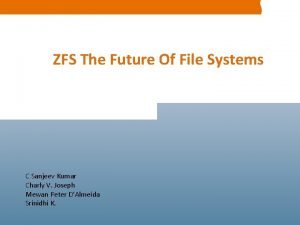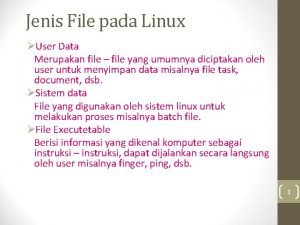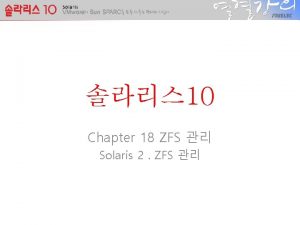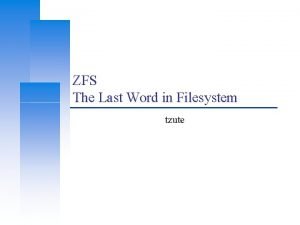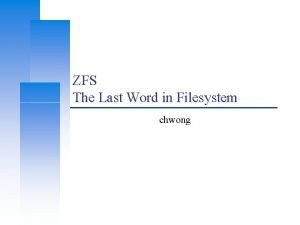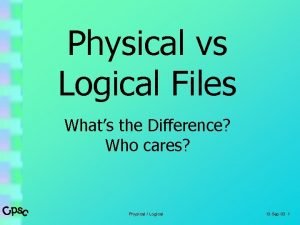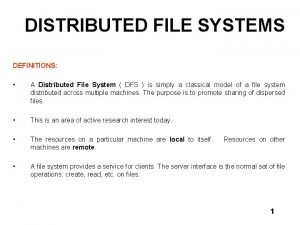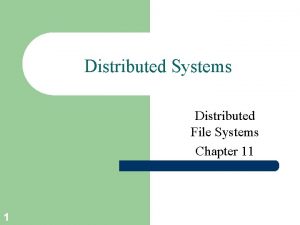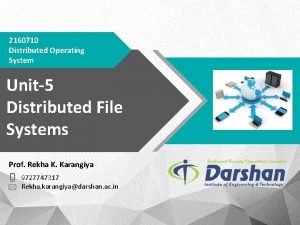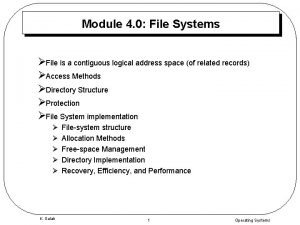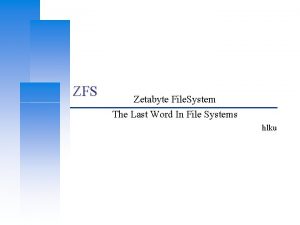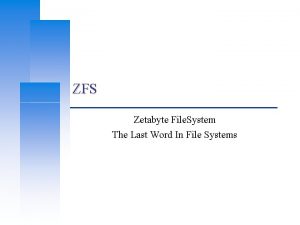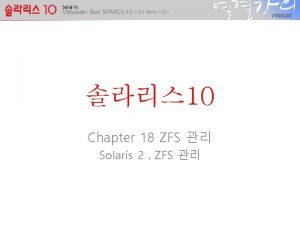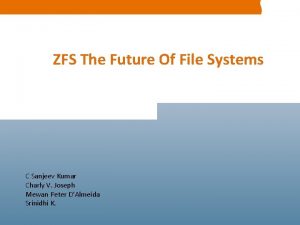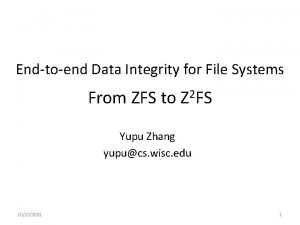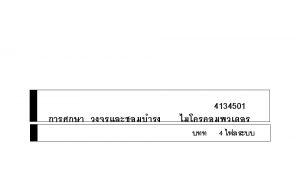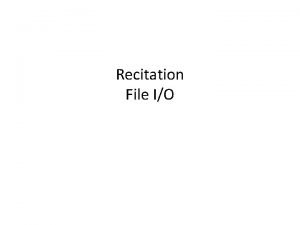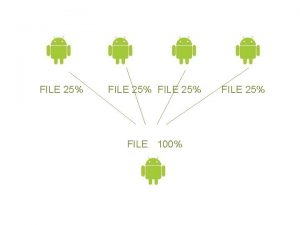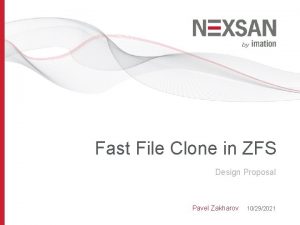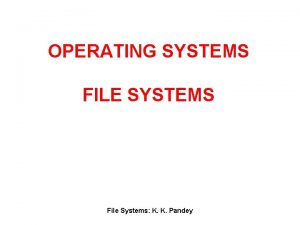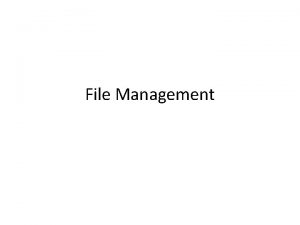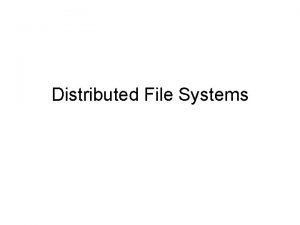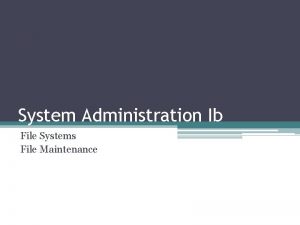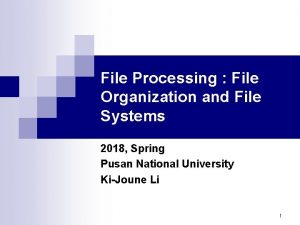ZFS The last word in File Systems IS



![Methodology l Semantic Block Analysis [ Prabhakaran et. al. ’ 05] Workload Application File Methodology l Semantic Block Analysis [ Prabhakaran et. al. ’ 05] Workload Application File](https://slidetodoc.com/presentation_image_h/7b657bfe2b94d55fbda7030db7a0b423/image-4.jpg)






















- Slides: 26

ZFS: The last word in File Systems - IS IT ? Swaminathan Sundararaman Sriram Subramanian

ZFS: Zettabyte File System l l The last word in file systems "We've rethought everything and rearchitected it, " - Jeff Bonwick, Sun distinguished engineer and chief architect of ZFS. l "We've thrown away 20 years of old technology that was based on assumptions no longer true today. "

Our Goal l To uncover interesting policies of ZFS l Focus on l How ZFS automatically chooses multiple block sizes, to match workload l Policy and performance analysis of ZFS during synchronous workloads
![Methodology l Semantic Block Analysis Prabhakaran et al 05 Workload Application File Methodology l Semantic Block Analysis [ Prabhakaran et. al. ’ 05] Workload Application File](https://slidetodoc.com/presentation_image_h/7b657bfe2b94d55fbda7030db7a0b423/image-4.jpg)
Methodology l Semantic Block Analysis [ Prabhakaran et. al. ’ 05] Workload Application File System Pseudo Device Driver OS Disk Block Inference

Preliminary Results l Naïve block allocation policy l l Dynamic merges small block writes l l l Does not work well for random workloads Suffers from Read-Modify-Write for some workload Poor ZFS Intent Log blocks allocation policy Dynamically changes the block writing mechanism based on workload (under investigation)

Outline l Infrastructure l l Policies l l Block Classification Strategy Block Allocation Dynamic block resizing ZFS Intent Log (ZIL) Conclusion

Infrastructure l Pseudo Device Driver l l Implemented a Block Driver using Layered Device Interface (LDI) Ioctls to control collection of statistics l l Issue: Solaris did not allow us to issue ioctls to pseudo block drivers Solution: Indirection l Wrote a dummy character driver and redirected the ioctl requests to our block device

Infrastructure (Contd. ) l Selective classification l Log files for Offline block analysis l Negligible performance overheads l Asynchronously written to the log file

Block Classification Strategy l Uber blocks l l l 1024 byte blocks Identified by its Magic Flag Data blocks l Identified by a special pattern l l Pattern repeated after ever 512 byte offset Individual data blocks l identified by seq. increasing numbers

Block Classification Strategy l ZIL blocks l l Identified by its Magic Flag Meta-data blocks l Rest of the blocks

Sequential Write of 1 GB file l l l Block size: 4 K ZFS Caches small block writes Large sequential 128 k block writes

Random writes inside 4 GB file l l Block size: 4 K Large 128 k block write for every small 4 k write

Random Writes of 4 K blocks Offset Block Size 36 40 20 40 84 88 0 88 20 88 52 88 16 88 4 88

Random Writes of 512 bytes Offset Block size 0 0. 5 16 16. 5 32 32. 5 64 64. 5 127. 5 128 150 128

Inference l Block Allocation l l Purely based on file offsets l Block size is set to 128 K for offsets >= 128 k l Block size is a multiple of 512 bytes for offsets < 128 k NOT based on dynamic workload characteristics

Small Sequential Writes of 4 K l Write 4 K blocks l Sleep 10 sec l Write Next block

Small Seq. Writes of 32 KBytes

Unmount after every write

Dynamic Resizing of Blocks l Until file sizes < 128 k l Appending data to small files in inefficient l If data is not in memory l Small append converted to Read-Modify-Write

COW in ZFS l Copy-on-write design makes most disk writes sequential l Multiple block sizes, automatically chosen to match workload

ZIL Block Chaining

ZIL Block Allocation

ZIL Block Allocation 33 K

Conclusions l Block Allocation l l l Dynamic Resizing of Blocks l l l Purely based on file offsets NOT based on dynamic workload characteristics Until file sizes < 128 k Appending data to small files in inefficient ZFS Intent Log l Internal fragmentation l Bad blocks allocation policy l Block chaining Mechanism

Conclusion l ZFS: The last Word in file systems l l Might be the latest word definitely not the last word !

Questions ?
 Zfs distributed file system
Zfs distributed file system File-file yang dibuat oleh user pada jenis file di linux
File-file yang dibuat oleh user pada jenis file di linux Trimagenda
Trimagenda Zfs internals
Zfs internals Oracle zfs backup appliance
Oracle zfs backup appliance Zfs nas appliance
Zfs nas appliance Zfs block storage
Zfs block storage Zfs vmware
Zfs vmware Vfs.zfs.l2arc_noprefetch
Vfs.zfs.l2arc_noprefetch Zilblock
Zilblock Zfs tuning
Zfs tuning Eignungs und orientierungspraktikum upb
Eignungs und orientierungspraktikum upb Physical image vs logical image
Physical image vs logical image File sharing management system
File sharing management system Distributed file system definition
Distributed file system definition An html file is a text file containing small markup tags
An html file is a text file containing small markup tags In a file-oriented information system, a transaction file
In a file-oriented information system, a transaction file Mobile file systems
Mobile file systems Coda
Coda Distributed file systems
Distributed file systems Module 4 operating systems and file management
Module 4 operating systems and file management Hình ảnh bộ gõ cơ thể búng tay
Hình ảnh bộ gõ cơ thể búng tay Frameset trong html5
Frameset trong html5 Bổ thể
Bổ thể Tỉ lệ cơ thể trẻ em
Tỉ lệ cơ thể trẻ em Gấu đi như thế nào
Gấu đi như thế nào Tư thế worm breton
Tư thế worm breton
